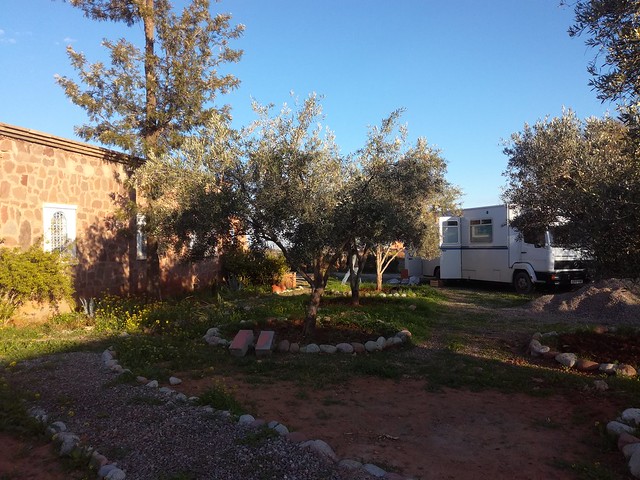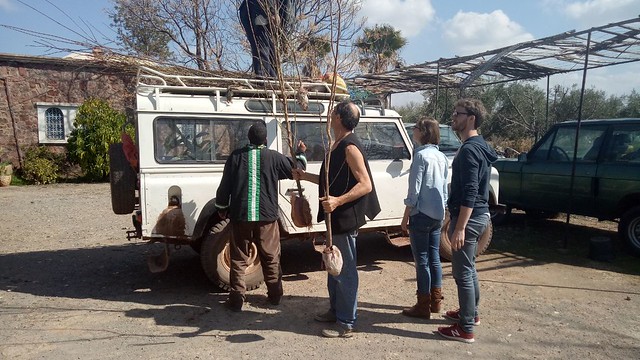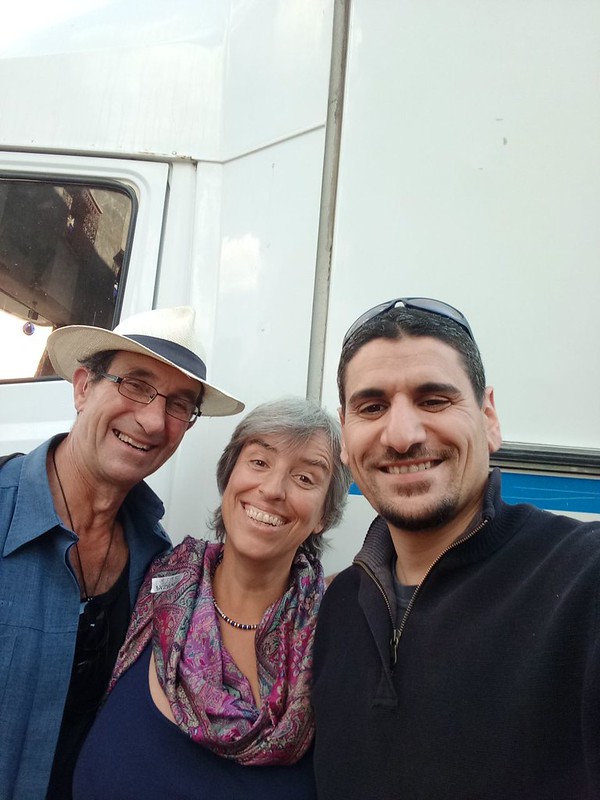Marrakesh Organics
We were very curious to see a farm with a permaculture approach here in Morocco. Our first impression came via the web: Marrakesh Organics has a very professional, well-formulated and informative web site … all the way to letting you see their business plans! The idea is that from the start about three years ago, they’ve recorded what and how they are doing and made their experiences available, as a resource, to other farmers in Morocco.
Next, we meet Omar, co-founder of Marrakesh Organics, a young and dynamic man in his 30ies. Having spent his childhood in Morocco and then spent 7 formative years in the USA, he has one foot in each culture. His grandfather started this farm and when he died in 2013, Omar, who’d had a close connection to him, felt the call to return to Morocco to continue his Grandfather’s work. We have a saying here in Morocco that if you plant a tree, you are responsible for its wellbeing, he says. In that sense, it feels good to be continuing what my grandfather started. When we began two years ago, the trees looked malnourished, but now look at them! We have installed drip-feed irrigation, we have fed them compost and planted nourishing crops beneath them.
As we walk across the fields, we can indeed see the difference – right at the bottom end, there are some trees they haven’t got to yet, with their programme of feeding and they are way behind in their growth, even though they were planted in the same year.
Permaculture has taken a bit of a back seat, Omar admits, as the land and the trees needed a lot of nourishment first, before he can think of a no-dig and no-watering method. It’s not off the table though – once there is a better balance in the soil, he wants to move towards the permaculture principles. It’s not just a question of balance in the soil; if there was an unlimited amount of time for the soil to regain its own health, then one could start with the permaculture principle right away. However, there is the need to make the farm financially viable asap, so Omar and his team (Kenza his wife, Mustafa and Lahsan) have chosen an interim method. In fact, part of the method includes taking on a number of other projects outside this farm to make money, in order to subsidise Marrakesh Organics. So, after two years of activity, right now work on the farm is laying low while Omar travels every day to oversee his various projects in the region, from pruning Olive trees for propagation to planting verbena on a large scale. He has a strong mind for running several projects at once, working out their viability, and a seemingly unlimited supply of energy to make them happen.
Omar is quite clear, on his website and also when we meet him, that his time is very precious, so we are a bit surprised to find him being happy to hang out with us in the evenings after returning from a long day’s work, as well as preparing a wonderful Moroccan breakfast one morning. I guess we all took to each other and sometimes it’s nice to push aside the pressing needs of the day and just hang out and chat, or maybe in the end his Moroccan nature won over and he created space in his otherwise tightly packed, western-feeling schedule 
Watching this young man and his energy, I wonder what it must feel like to be coping with the demands of two such divergent cultures. Quite likely in both of them, the 30s are the years where one has to prove oneself to one’s surroundings, family and peers: The building of one’s career, one’s house/home and one’s family all converge (I so remember the feeling! And watching Omar, I realise how much I have changed and moved into a different chapter in my life). Where there may well be a fundamental difference between the cultures is what they each consider to be a successful career. I imagine that agriculture here has a much higher status than it does in the first world. Education is a value that both cultures share, and to create a learning environment on the farm is a good way of combining the two cultures. As it develops and offers all sorts of courses, I can really see its potential for providing a good meeting point for people from different walks of life.
We spend a few days at the farm, enjoying its peaceful nature and getting some of our stuff done (such as doing our washing and writing the blog) as well as satisfying our yearning to touch the earth by working a bit on the farm. Frank clears a hedgerow of dead wood and I remove several rows of blighted tomato plants from one of the poly-tunnels. We use the dead wood to make a fire to burn the tomato plants. Somehow, we manage to fall out over making the fire. It happens so rarely that we are out of kilter with each other (at most once a year), that it is a bit of a shock to the system and although it wasn’t a big thing, it takes us a couple of days to truly clear the air and re-establish our usual harmony. Meanwhile, Frank makes marmalade and I make chutney from the green tomatoes. One day, a large load of assorted fruit trees arrives and we are privileged to share the excitement and help to take them off the roof of the car.
The next day, while Frank starts on the digging of holes for the trees, I help planting out courgettes, cucumbers and squashes in the poly-tunnel.
One evening, we invite Omar to a Tajine at Restaurant Rozelaar. Frank is very nervous about cooking Moroccan food for a Moroccan, but all goes well. We eat and share stories… through Omar’s tales, we learn a bit about the Moroccan way of making deals. For example, a manager of a big olive estate may earn twice when it comes to pruning the trees -once from the owner, who he will invoice to pay the workers for the pruning and a second time by charging those who want to buy the cuttings for propagation or for animal fodder. The buyer might even be the one doing the pruning! My German mind boggles. I want to suggest that the buyer directly gets in touch with the owner, thus cutting out the middleman and possibly neither having to pay anything and both being better off for it, but that’s obviously not the way things work here.
I now realise why we might have rubbed Ali, at Lezagmouzen camping, up the wrong way when we went to see Ahmed, the owner of the campsite, to discuss the possibility of buying it. There’s something about the power of the middleman here that I don’t quite understand.
On the day we leave, we give Omar a lift to one of his projects and we share lunch in a nearby café. Frank wants to buy some good quality meat and we learn from Omar that you need to signal to the butcher that you are happy to pay more than the advertised price. Otherwise they will have added fat and bone to make up the weight. A very valuable lesson for shopping in Morocco!
It’s hard to say good-bye. Even though we only spent a few days with Omar, we feel like we are leaving a close friend. We obviously have to come back, insha’llah, and meet his wife too next time, insha’llah.
For more photos of this chapter, click here
Posted in Uncategorizedwith comments disabled.


